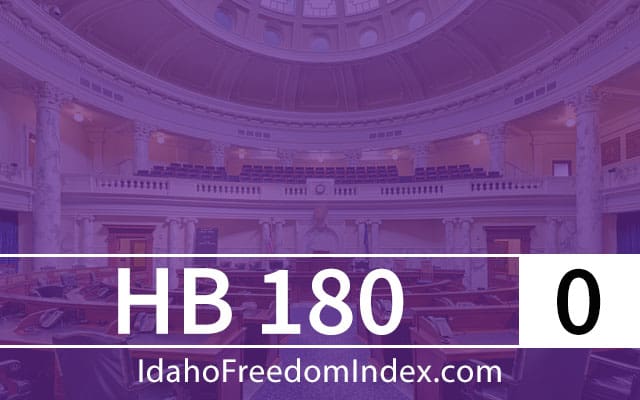


Bill description: HB 180 would expressly allow syringe and needle exchanges to operate in Idaho, and would regulate their operation.
Rating: 0
Does it directly or indirectly create or increase penalties for victimless crimes or non-restorative penalties for non-violent crimes? Conversely, does it eliminate or decrease penalties for victimless crimes or non-restorative penalties for non-violent crimes?
In Idaho, state law imposes an effective prohibition on needle exchange programs. The Uniform Controlled Substances Act, which the state has adopted, states:
“It is unlawful for any person to deliver, possess with intent to deliver, or manufacture with intent to deliver, drug paraphernalia, knowing, or under circumstances where one reasonably should know, that it will be used to plant, propagate, cultivate, grow, harvest, manufacture, compound, convert, produce, process, prepare, test, analyze, pack, repack, store, contain, conceal, inject, ingest, inhale, or otherwise introduce into the human body a controlled substance. Any person who is in violation of this section is guilty of a felony and upon conviction may be imprisoned for not more than nine (9) years, fined not more than thirty thousand dollars ($30,000), or both.”
(Section 37-2734B, Idaho Code)
Given this prohibition, any person or organization who operates a needle or syringe exchange program could be charged with a felony and found guilty of violating the state statute. Syringes and needles are defined as drug paraphernalia when their use is intended for injecting drugs, in 37-2701(n), Idaho Code. Since clean needles and syringes are exchanged for dirty needles and syringes are expressly for the purpose of administering a controlled substance, the operators of an exchange could be found guilty of violating the law under current state statutes.
HB 180 would exempt any entity operating these programs from the criminal penalties which would otherwise be imposed.
(+1)
Does it create, expand, or enlarge any agency, board, program, function, or activity of government? Conversely, does it eliminate or curtail the size or scope of government?
HB 180 would require any needle exchange that operates in the state to abide by the regulations adopted by the state Department of Health and Welfare. In addition, organizations or individuals operating these exchanges would have to report to the department each year the number of individuals who have made an exchange and the total number of needles and syringes exchanged. The department would then have to provide this information to the Legislature with a recommendation for the continuation of the program, along with “the potential for additional reductions in the number of syringes and needles contaminated with blood-borne diseases if the programs receive additional funding.”
(-1)


